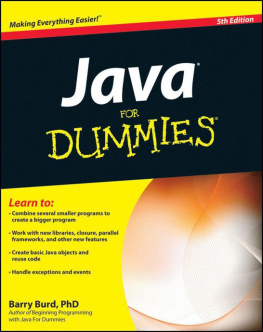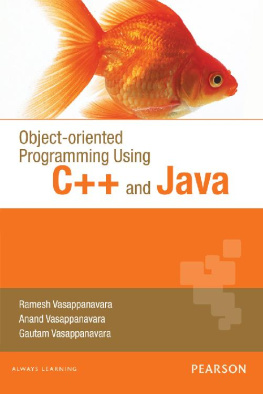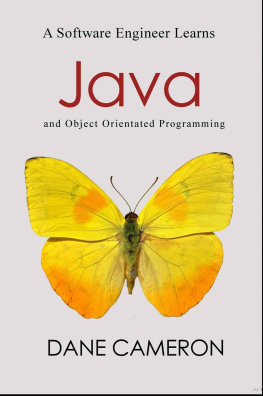Object Oriented Programming in Java Attend class lecturers from home By Vaskaran Sarcar ME, MCA, B.Sc. (Math) Copyright Object Oriented Programming in Java Copyright 2015 Vaskaran Sarcar. [Version: 1.0] License Notes This book is licensed for your personal development only. This book may not be re-sold or given away to other people. If you would like to share this book with another person, please purchase an additional copy for each recipient. If youre reading this book and did not purchase it, or it was not purchased for your use only, then please return to your favorite book retailer and purchase your own copy.
Thank you for respecting the hard work of this author. Disclaimer and Terms of Use: Effort has been made to ensure that the information in this book is accurate and complete, however, the author and the publisher do not warrant the accuracy of the information, text and graphics contained within the book due to the rapidly changing nature of science, research, known and unknown facts and internet. The Author and the publisher do not hold any responsibility for errors, omissions or contrary interpretation of the subject matter herein. This book is presented solely for motivational and informational purposes only. A letter from Author Dear Reade r , Welcome to the journey. It is my privilege to enclose herewith Object Oriented Programming in Java: Attend class lecturers from home .
Before jump into the topic, I want to highlight few points about the topic and its contents: 1. The aim of this book is to help you to get a feel of a Java classroom environment. I was involved in teaching since 2005.I have taken classes in both engineering and non-engineering colleges. And fortunately most of my teaching involvement was based on Java and its advanced topics. That is the true motivation to introduce a book like this. This book will not discuss how to write an if-else statement or a simple while loop etc.
Your teacher expects that before attending the class, you have done your basic homework. Here your teacher will focus on the basic object oriented concepts that we can implement in Java. 3. With this book you will have a feel that you are learning Java in a classroom environment-where your teacher will discuss about some problems/topics, ask you questions and give you assignments. You will be encouraged to do those simple assignments before entering into a new topic. 4. 4.
In a semester, there is a certain number of lectures to complete the fundamental topics. And we all know that learning is a continuous process. So, this book is not for those who want to learn Java in 24 hours or in 7 days . It is up to you only. I can only say : the book is designed for you in such a way that after completion of the book, you will develop an adequate knowledge on the topic, youll learn the key features of this powerful language, youll learn how we should write programs in Java and most importantly, how to go further. 5.
Lastly the programs are tested with eclipse. Though it is not mandatory for you to learn eclipse. You can simply run these programs in your preferred IDE. Author has chosen eclipse because it is widely used to develop Java applications. The Author Contents
Basic Terms
JVM -It stands for Java Virtual Machine. When we compile the java file, we get a .class (not an .exe).This file contains java byte code which is interpreted by JVM.
It is responsible for loading, verifying and executing the code .We say that JVM is platform dependent because it is responsible to convert the bytecodes into the machine language for the specific computer/machine. JRE -It stands for Java Runtime environment. It contains the JVM, the library files and the other supporting files. To run a java program, the JRE must be installed in the system. So, we can simply say JRE=JVM+ some packages. JDK -It stands for Java Development Kit.
It provides the tool which we need to develop java programs and JRE. This tools contains javac.exe, java.exe etc. When we launch a java application, it will open the JRE and load the class and then, in turn, it will execute the main method. So, we can conclude that JDK=JRE+ Development tools. Bytecode Bytecodes are machine language of the JVM. They provide the instruction set for a JVM.
In other words, it is a virtual machine language in which java code is compiled. JVM comes into the picture because it stands between these bytecodes and our physical machine. Platform -We use the term platform to mean where the program will run. It can be your machine, your fully developed OS etc. When we say a language is platform independent, we mean that the code of a programmer will not vary across different platforms. So once the java program is compiled, we get the bytecodes.
These bytecode format is same for every platform (Windows/Linux/Solaris etc.).So, we need an interpreter who will interpret these bytecode and will produce the machine specific codes. Now JVM comes into the picture. Here in Java, these bytecodes are interpreted by JVM which is available for all OS. So, to port the java program into a new platform, we need to port the java interpreter. So the pair -JVM and bytecode make Java portable. Note: So the bottom line is that the trio- JVM, JRE and JDK are platform dependent (because of the OS dependence) but Java is platform independent.
We must remember the simple fact: Any machine language is dependent on the OS of the machine. So, if we have dependency on the machine specific OS, we are not platform independent. Java is platform independent because once the source code is compiled into standard bytecodes, those bytecodes are platform independent. Because of this facility Sun Microsystem is created the slogan WORA (Write Once Run Anywhere) for Java. IDE It stands for Integrated Development Environment. They provide the facilities for software development.
In general, they are very smart- they provide us intelligent code completion technique. They can also highlight/suggest about different kinds of possible fixes in our code. An IDE should have a source editor, a debugger and the automation tools to build the application. IDEs, in general, contain a compiler or an interpreter (or both). We have used eclipse here which contains both of these. 1. JDK 2. JDK 2.
IDE Visit the page: http://www.oracle.com/technetwork/java/javase/downloads/index.html Or To download JDK, directly go here: http://www.oracle.com/technetwork/java/javase/downloads/jdk8-downloads-2133151.html Youll get a screen containing something like this:  Try to download the latest version based on your system configuration (e.g. 32 bit/64 bit, Windows/Linux etc.) To download eclipse IDE: Go here. https://eclipse.org/downloads/ As mentioned above try to download the latest version based on your system configuration.
Try to download the latest version based on your system configuration (e.g. 32 bit/64 bit, Windows/Linux etc.) To download eclipse IDE: Go here. https://eclipse.org/downloads/ As mentioned above try to download the latest version based on your system configuration.
Naming Conventions
Class- should start with an uppercase letter and should be a noun e.g. MyClass, String etc. Interface/s- should start with an uppercase letter and should be an adjective e.g.
Runnable, Remote Method/s- They should start with a lowercase letter and be a verb e.g. main(), showMyMethod() etc. Variable/s- They should start with lowercase letter e.g. myIntegerValue, myDoubleValue, myName etc. Package/s- They should be all in lower case latter e.g. mypackage, package1 etc.
Constants- They should be in uppercase letters e.g. MY_CONSTANT etc. Apart for few special cases, we have tried to maintain these conventions across the book.
Introduction
History: In June 1991, James Gosling, Mike Sheridan and Patrick Naughton initiated the project of Java language. There was an Oak tree outside Goslings office. And people say that this is why, originally the language was named Oak.




![Mark Lassoff [Mark Lassoff] - Java Programming for Beginners](/uploads/posts/book/119362/thumbs/mark-lassoff-mark-lassoff-java-programming-for.jpg)


 Try to download the latest version based on your system configuration (e.g. 32 bit/64 bit, Windows/Linux etc.) To download eclipse IDE: Go here. https://eclipse.org/downloads/ As mentioned above try to download the latest version based on your system configuration.
Try to download the latest version based on your system configuration (e.g. 32 bit/64 bit, Windows/Linux etc.) To download eclipse IDE: Go here. https://eclipse.org/downloads/ As mentioned above try to download the latest version based on your system configuration.